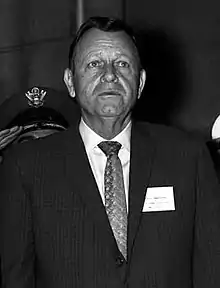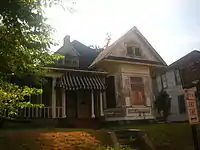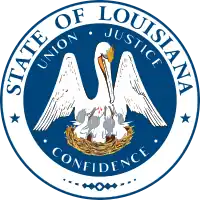Jimmie Davis
James Houston Davis (September 11, 1899 – November 5, 2000) was an American singer, songwriter, and politician. After achieving fame for releasing both sacred and popular songs, Davis served as governor of Louisiana from 1944 to 1948 and again from 1960 to 1964. As Governor, Jimmie was an opponent of efforts to desegregate Louisiana.[1]
Jimmie Davis | |
|---|---|
 Davis in 1962 | |
| 47th Governor of Louisiana | |
| In office May 10, 1960 – May 12, 1964 | |
| Lieutenant | Taddy Aycock |
| Preceded by | Earl Long |
| Succeeded by | John McKeithen |
| In office May 9, 1944 – May 11, 1948 | |
| Lieutenant | J. Emile Verret |
| Preceded by | Sam H. Jones |
| Succeeded by | Earl Long |
| Personal details | |
| Born | James Houston Davis September 11, 1899 Jackson Parish, Louisiana, U.S. |
| Died | November 5, 2000 (aged 101) Baton Rouge, Louisiana, U.S. |
| Resting place | Jimmie Davis Tabernacle Cemetery, Quitman, Louisiana |
| Political party | Democratic |
| Spouse(s) | Alvern Adams (died 1967) Anna Gordon (m. 1969) |
| Children | 1 |
| Education | Louisiana Christian University (BA) Louisiana State University (MA) |
| Profession | Singer, songwriter, former educator, politician |

Davis was a nationally popular country music and gospel singer from the 1930s into the 1960s, occasionally recording and performing as late as the early 1990s. He appeared as himself in a number of Hollywood movies. He was inducted into six halls of fame, including the Country Music Hall of Fame, the Southern Gospel Music Association Hall of Fame, and the Louisiana Music Hall of Fame. At the time of his death in 2000, he was the oldest living former governor as well as the last living governor to have been born in the 19th century.
Early life and career
Childhood and birth date confusion
Davis was not sure of his date of birth; according to The New York Times, "Various newspaper and magazine articles over the last 70 years said he was born in 1899, 1901, 1902 or 1903. He told The New York Times several years ago that his sharecropper parents could never recall just when he was born – he was, after all, one of 11 children – and that he had not had the slightest idea when it really was."[2][3] The birth date listed on his Country Music Hall of Fame plaque is September 11, 1904.[4]
Education
Davis graduated from Beech Springs High School and from Soule Business College, in New Orleans.[5] His 1927 master's thesis, which examines the intelligence levels of different races, is titled Comparative Intelligence of Whites, Blacks and Mulattoes.[6]
Career beginnings
During the late 1920s, Davis taught history (and, unofficially, yodeling) for a year at the former Dodd College for Girls in Shreveport. The college president, Monroe E. Dodd, who was also the pastor of First Baptist Church of Shreveport and a radio preacher, invited Davis to serve on the faculty.[7]
Musical career
Davis became a commercially successful singer of rural music before he entered politics. His early work was in the style of country music singer Jimmie Rodgers. Davis was also known for recording energetic and raunchy blues tunes, such as "Red Nightgown Blues" and "Tom Cat and Pussy Blues".[8] Some of these records included slide guitar accompaniment by black bluesman Oscar "Buddy" Woods.[8] During his first run for governor, opponents reprinted the lyrics of some of these songs in order to undermine Davis's campaign. In one case, anti-Davis forces played some records over an outdoor sound system, only to give up after the crowds started dancing, ignoring the double-entendre lyrics. Until the end of his life, Davis never denied or repudiated those records.
In 1999, "You Are My Sunshine" was honored with a Grammy Hall of Fame Award, and the Recording Industry Association of America named it one of the Songs of the Century. "You Are My Sunshine" was ranked in 2003 as No. 73 on CMT's 100 Greatest Songs in Country Music.[9] Until his death, Davis insisted that he wrote the song.[10] Virginia Shehee, a Shreveport businesswoman, philanthropist, and state senator, introduced legislation to designate "You Are My Sunshine" as the official state song.[11] The song was reportedly written for Elizabeth Selby, a resident of Urbana, Illinois and housemother of Wescoga ("Wesley Co-Op for Gals") at the time the song was written.
Davis often performed during his campaign stops when running for governor of Louisiana. After being elected in 1944, he became known as the "singing governor." While governor, he had a No. 1 hit single in 1945 with "There's a New Moon Over My Shoulder".[8] Davis recorded for the Victor Talking Machine Company, and Decca Records for decades and released more than 40 albums.
A long-time Southern Baptist, Davis recorded a number of Southern gospel albums.[8] In 1967 he served as president of the Gospel Music Association. He was a close friend of the North Dakota-born band leader Lawrence Welk, who frequently reminded viewers of his television program of his association with Davis.
A number of his songs were used as part of motion picture soundtracks. Davis appeared in half a dozen films, including one starring Ozzie and Harriet, who had a TV series under their names. Members of Davis's last band included Allen "Puddler" Harris of Lake Charles. He had served as pianist for singer Ricky Nelson early in his career.
Davis was also a close acquaintance of the country singer-songwriter Hank Williams, with whom he co-wrote the top-10 hit[12] "(I Heard That) Lonesome Whistle" in 1951, supposedly on a fishing day they spent together.
Singles

| Year | Single | US Country |
|---|---|---|
| 1934 | "Nobody's Darling but Mine" | — |
| 1937 | "Nobody's Darling but Mine" Jimmie Davis With Charles Mitchell And His Texan | — |
| 1938 | "Meet Me Tonight in Dreamland" | — |
| "There's a Gold Mine in the Sky"[13] | — | |
| 1939 | "Two More Years (and I’ll Be Free)"[14] | 1 |
| "It Makes No Difference Now"[15] | 1 | |
| "The Last Trip Of The Old Ship"[16] | 2 | |
| "Memories"[17] | 5 | |
| 1940 | "I’d Love to Call You My Sweetheart"[18] | 1 |
| "Baby Your Mother" | 2 | |
| "You're As Welcome As The Flowers In May"[19] | 6 | |
| "You Are My Sunshine" | — | |
| 1941 | "I'm Sorry Now"[20] | 3 |
| 1942 | "I've Got My Heart On My Sleeve" | 3 |
| "You'll Be Sorry" | 4 | |
| "Sweethearts Or Strangers"[21] | 6 | |
| "I Loved You Once" | 6 | |
| "Don't You Cry Over Me" | 6 | |
| "The End Of The World" | 7 | |
| "What More Can I Say" | 8 | |
| "I'm Thinking Tonight Of My Blue Eyes" | 10 | |
| 1943 | "Columbus Stockade Blues" | 2 |
| "Where Is My Boy Tonight" | 7 | |
| "I'm Knocking At Your Door Again" | 7 | |
| "I Dreamed Of An Old Love Affair" | 8 | |
| "A Sinner's Prayer" | 13 | |
| 1944 | "Is It Too Late Now" | 3 |
| "There's a Chill on the Hill Tonight" | 4 | |
| 1945 | "There's a New Moon Over My Shoulder" | 1 |
| 1946 | "Grievin' My Heart Out for You" | 4 |
| 1947 | "Bang Bang" | 4 |
| 1951 | "(I Heard That) Lonesome Whistle" | 9 |
| 1962 | "Where the Old Red River Flows" | 15 |
Political career

Davis was elected in 1938 as Shreveport's public safety commissioner. At the time, Shreveport had the city commission form of government. After four years in Shreveport City Hall, Davis was elected in 1942 to the Louisiana Public Service Commission. The rate-making body meets in the capital, Baton Rouge. He was elected during his term as governor and left after two years.
First term as governor (1944–1948)
Davis was elected governor as a Democrat in 1944. Among those eliminated in the primary were State Senator Ernest S. Clements of Oberlin in Allen Parish, freshman U.S. Representative James H. Morrison of Hammond in Tangipahoa Parish, and Sam Caldwell, the mayor of Shreveport. Davis and Caldwell had served together earlier in Shreveport municipal government.
In the runoff, Davis defeated Lewis L. Morgan, an elderly attorney and former U.S. representative from Covington, the seat of St. Tammany Parish, who had been backed by former Governor Earl Kemp Long and New Orleans Mayor Robert Maestri. In the runoff, Davis received 251,228 (53.6 percent) to Morgan's 217,915 (46.4 percent).
Davis pleased white liberals with his appointments to high positions of two of the leaders of the impeachment effort against Huey Long. He named Cecil Morgan of Shreveport to the Louisiana Civil Service Commission. Morgan was succeeded in the Louisiana House by Rupert Peyton of Shreveport, who also served as an aide to Davis. In addition, Davis retained the anti-Long Ralph Norman Bauer of St. Mary Parish as House speaker, a selection made originally in 1940 by Sam Jones.[22]
Earl Long was seeking the lieutenant governorship on the Lewis Morgan "ticket" and led in the first primary in 1944, but he lost the runoff to J. Emile Verret of New Iberia, then the president of the Iberia Parish School Board.
Davis kept his hand in show business, and set a record for absenteeism during his first term. He made numerous trips to Hollywood to make Western "horse operas."[23]
Under the term limit provision of the state constitution then in effect, Davis was limited to a single non-consecutive term in office.
The election of 1959–1960
When he became a candidate for a second term in 1959–60, Davis had been out of office for nearly a dozen years. In a later study of this election, three Louisiana State University political scientists described him by the following:
Davis has all the external attributes of a "man of the people", but his serious political connections seem to be with the [parish-seat] elite and its allies, particularly the major industrial combinations of the state. He is in many respects a toned-down version of the old-style southern politician who could spellbound the mass of voters into supporting him regardless of the effects of his programs on their welfare. ... Davis creates the perfect image of a man to be trusted and one whose intense calm is calculated to bring rational balance into the political life of the state.[24]
Davis was running at a time when African Americans in the civil rights movement were seeking social justice and restoration of their constitutional rights. In 1954 the US Supreme Court had ruled in Brown v. Board of Education that segregation in public schools was unconstitutional and urged states to integrate their facilities. With a pledge to fight for continued segregation in public education, Davis won the Democratic gubernatorial nomination over a crowded field.
Davis ran second in the primary to "Chep" Morrison, considered an anti-Long liberal by Louisiana standards. He defeated Morrison in the party runoff held on January 9, 1960. As African Americans (who had supported the Republican Party after the Civil War) were still largely disenfranchised in Louisiana, the Democratic primary was the only competitive race for office in the one-party state.
It has been reported that had General Curtis LeMay turned down George C. Wallace's offer to be his candidate for vice president in 1968 on the American Independent Party ticket, that Wallace was ready to announce Davis as his selection for vice president. Other sources say Wallace's second choice was the former governor of Arkansas, Orval Faubus.[25]
Second term (1960–1964)
As part of his support of segregation, Davis initiated passage of state legislation to create the Louisiana State Sovereignty Commission, which operated from 1960 to 1967. It "espoused states rights, anti-communist and segregationist ideas, with a particular focus on maintaining the status quo in race relations. It was closely allied with the Louisiana Joint Legislative Committee on Un-American Activities."[26] It was modeled after Mississippi's commission, established in 1956 to resist integration. Davis tapped Frank Voelker Jr., City Attorney of Lake Providence, to chair the newly established Commission. It was given unusual powers to investigate state citizens, and used its authority to exert economic pressure to suppress civil rights activists. Voelker left the commission in 1963 to run for governor but placed poorly in the primary; he withdrew and supported other candidates.[27]
Political legacy
Davis established a State Retirement System and funding of more than $100 million in public improvements, while leaving the state with a $38 million surplus after his first term.[28]
Earl Long once remarked that Davis was so relaxed and low-key that one could not "wake up Jimmie Davis with an earthquake".[29]
Public relations specialist Gus Weill, who worked in the Davis campaign in 1959, wrote a biography of the former governor in 1977, entitled You Are My Sunshine, based on Davis' best-known song.[30]
Personal life

Davis's first wife, the former Alvern Adams, the daughter of a physician in Shreveport, was the first lady while he was governor during both terms. Two years after her death in 1967, Davis married Anna Gordon, born Effie Juanita Carter (February 15, 1917 – March 5, 2004). A founding member of the gospel quartet The Chuck Wagon Gang along with her father, a sister and a brother, she had been given the stage name "Anna" during the mid-1930s. Davis was a longtime fan of the group, who were gospel music pioneers with more than 36 million records sold in forty years of affiliation with Columbia Records.

Davis died on November 5, 2000. He had suffered a fall in his home some ten months earlier and may have had a stroke in his last days. He is interred alongside his first wife at the Jimmie Davis Tabernacle Cemetery in his native Beech Springs community near Quitman. Jim Davis was cremated.[32][33]
Davis was aged 101 years and 55 days,[32] which made him the longest-lived of all U.S. state governors at the time of his death. Davis held this record until March 18, 2011, when Albert Rosellini of Washington achieved a greater lifespan of 101 years, 56 days, dying 206 days later.
Honors


The Jimmie Davis Tabernacle is located near Weston in Jackson Parish. The tabernacle hosts occasional gospel singing. At the site is a replica of the Davis homestead (c. 1900) and of the Peckerwood Hill Store, an old general store that served the community.
Davis was inducted into the Nashville Songwriters Hall of Fame in 1971, the Country Music Hall of Fame in 1972, the Southern Gospel Music Association Hall of Fame in 1997 and The Louisiana Music Hall of Fame in 2008. In 1993, Davis was among the first thirteen inductees of the Louisiana Political Museum and Hall of Fame in Winnfield.[34]
The Davis archives of papers and photographs is housed in the "You Are My Sunshine" Collection of the Linus A. Sims Memorial Library at Southeastern Louisiana University in Hammond.[35]
Filmography
Davis had several appearances in movies (usually or always as himself), including:
- 1942: Strictly in the Groove
- 1942: Riding Through Nevada
- 1943: Frontier Fury
- 1944: Cyclone Prairie Rangers
- 1947: Louisiana
- 1949: Mississippi Rhythm
- 1950: Square Dance Katy
See also
- List of governors of Louisiana
- Jim Flynn, a writer encouraged when Davis signed his first song writing contract
References
- Severo, Richard (November 6, 2000). "Jimmie Davis, Louisiana's Singing Governor, Is Dead". The New York Times. ISSN 0362-4331. Retrieved March 29, 2022.
- "Jimmie Davis, Louisiana's Singing Governor, Is Dead". The New York Times. November 6, 2000. Retrieved July 17, 2016.
- OLIVER, MYRNA (November 7, 2000). "Jimmie Davis; 'Singing Governor' Spread Sunshine". LA Times. Retrieved July 17, 2016.
- "Jimmie Davis Country Music Hall of Fame Plaque. Presented - Lot #21201 - Heritage Auctions". Retrieved July 17, 2016.
- Patrick Kavanaugh and Barbara Kavanaugh, Devotions from the World of Music (2000), p. 326.
- "Comparative intelligence of whites, blacks and mulattoes". Louisiana State University Library Catalog. Retrieved October 26, 2020.
- "Jimmie Davis, country singer and former two-term governor of Louisiana, was born 123 years ago today". Frank Beacham's Journal. Retrieved October 24, 2022.
- Colin Larkin, ed. (1993). The Guinness Who's Who of Country Music (First ed.). Guinness Publishing. pp. 108/9. ISBN 0-85112-726-6.
- "CMT 100 Greatest Country Songs".
- Russell, Tony (April 29, 1998). You Are My Sunshine 5CD Box Set. Bear Family Records. pp. liner notes (booklet) UPC/EAN=4000127162168.
- "Virginia Ruth Kilpatrick Shehee". The Shreveport Times. Retrieved July 9, 2015.
- "Articles". Hpcisp.com. Retrieved December 31, 2019.
- "78 Record: Jimmie Davis - There's A Gold Mine In The Sky (1938)". 45worlds.com. Retrieved December 31, 2019.
- "The Billboard December 30, 1939 p146". worldradiohistory.com. December 30, 1939. Retrieved August 24, 2021.
- "The Billboard August 26, 1939 p129". worldradiohistory.com. August 26, 1939. Retrieved August 24, 2021.
- "The Billboard November 25, 1939 p68". worldradiohistory.com. November 25, 1939. Retrieved August 24, 2021.
- "The Billboard May 27, 1939 p69". worldradiohistory.com. May 27, 1939. Retrieved August 25, 2021.
- "The Billboard March 30, 1940 p69". worldradiohistory.com. March 30, 1940. Retrieved August 24, 2021.
- "The Billboard September 28, 1940 p70". worldradiohistory.com. September 28, 1940. Retrieved August 24, 2021.
- Holder, Sara H. (March 2004). "The Internet Hockey Database2004107Ralph Slate. The Internet Hockey Database. Springfield, MA, August 1998 to date. Gratis URL: www.hockeydb.com. Last visited November 2003". Reference Reviews. 18 (2): 59–60. doi:10.1108/09504120410521268. ISSN 0950-4125.
- "The Billboard February 28, 1942 p60". worldradiohistory.com. February 28, 1942. Retrieved August 24, 2021.
- "Smith, James Monroe". A Dictionary of Louisiana Biography (Louisiana Historical Association). Archived from the original on July 16, 2016. Retrieved March 25, 2011.
- Mathur, Monika (June 23, 2009). "A look at odd behavior by US governors". Associated Press. Retrieved January 30, 2018.
- William C. Havard, Rudolf Heberle, and Perry H. Howard, The Louisiana Elections of 1960, Baton Rouge: Louisiana State University Studies, 1963, pg. 40
- "The Campaign: George's General". Content.time.com. October 11, 1968. Retrieved December 31, 2019.
- "Louisiana State Sovereignty Commission" Archived December 5, 2019, at the Wayback Machine, Amistad Research Center, Tulane University; Sources: Adam Fairclough. Race and Democracy: The Civil Rights Struggle in Louisiana, 1915-1972. Athens, GA: University of Georgia Press, 1995.
- Havard, Heberle, and Howard, The Louisiana Election of 1960, pg. 99
- "Louisiana Secretary of State". Archived from the original on August 12, 2007. Retrieved July 17, 2016.
- James Carville (May 8, 2012). "Carville: Wake up Democrats; you could lose". Cnn.com. Retrieved July 17, 2016.
- You Are My Sunshine: The Jimmie Davis Story, An Affectionate Biography (Baton Rouge: Pelican Publishing Company, 1977); ISBN 0882896601 (0-88289-660-1)
- Source: Historic marker, Eglin House in Shreveport
- ""Sunshine" singer Jimmie Davis dead at 101". Mtv.com. Archived from the original on January 29, 2013. Retrieved October 21, 2012.
- "James William Davis obituary". Monroe News Star. Retrieved November 9, 2012.
- "Louisiana Political Museum and Hall of Fame". Cityofwinnfield.com. Archived from the original on July 3, 2009. Retrieved August 22, 2009.
- Davis Collection at Southeastern, Selu.edu, (retrieved 2012-05-06).
Sources
- Toru Mitsui (1998). "Jimmie Davis." In The Encyclopedia of Country Music. Paul Kingsbury, Ed. New York: Oxford University Press. p. 136.
- Kevin S. Fontenot, "You Can't Fight a Song: Country Music in Jimmie Davis' Gubernatorial Campaigns," Journal of Country Music (2007).
External links
- Jimmie Davis at IMDb
- State of Louisiana Biography
- Cemetery Memorial by La-Cemeteries
- Listen to Jimmie singing "She's a Real Hum Dinger"
- Jimmie Davis recordings at the Discography of American Historical Recordings.
- at the Country Music Hall of Fame and Museum
- Jimmie Davis Collection and Jimmie Davis Photo Collection at Southeastern Louisiana University in Hammond.
- Southern Gospel Music Association Hall of Fame and Museum
